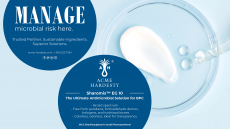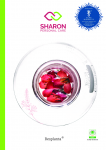Ashland initiative develops skin care products addressing microflora ecology
This will lead to the chemical company showing how a biofunctional ingredient based on flax seed may be used to support cathelicidin and β-defensin antimicrobial peptides, an important class of biological peptides necessary to maintain a proper ecosystem balance on skin.
The initiative brings together biologists from Ashland's skin research together with formulation and consumer science professionals to help skin care product makers commercialize new innovations that address the microflora ecology on the skin surface.
Probiotics
"Probiotics are consumed by millions of people every day to help balance the body's inner microflora. Likewise, it may be possible to enhance the natural microbiome and biochemical shield on the surface of skin with a topical cream containing Lipigenine biofunctional," said Justine Cotton, marketing manager, skin care biofunctionals, Ashland Care Specialties.
"Inspiration for our biofunctional derived from flax seed comes from the process pertaining to skin's own lipid production in the stratum corneum, which goes beyond a physical barrier function to include a biochemical shield against the proliferation of undesirable microorganisms."
According to the US-based firm, enhancing cathelicidin LL-37 and β-defensin antimicrobial peptides may support ecosystem balance on the skin surface and may enhance the appearance of skin.
Results
Ashland's lab work demonstrated that it is possible to enhance the expression of beneficial cathelicidin LL-37 and β-defensin antimicrobial peptides in keratinocytes 24 hours after topical application of 1 percent (active) Lipigenine biofunctional.
"The results surpassed our own expectations," said Cotton. "In vitro and ex vivo test results suggest an improvement in the expression of antimicrobial peptides that ranged from approximately 50 percent to nearly 150 percent.”
“Follow-up efficacy testing showed significant growth inhibition of an undesirable microbe after contact with cultured medium from keratinocytes. Based on these results, we envision a new category of skin care products that may assist the skin in its natural efforts to normalize microflora on the surface of skin and balance its ecosytem to help protect against external stresses."














